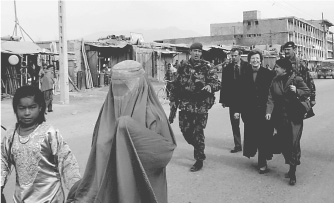Human rights foreign policy and the role of the United Nations

Chapter 3 The story of the UN’s human rights treaties may leave us dissatisfied. Where is the enforcement of these rights? We have a legal framework and reports from non-governmental organizations, but where is the pressure to ensure that these rights are realized in practice? What does it really mean when governments say that their foreign policy is concerned with promoting and protecting human rights? Only very rarely do governments actually use these treaties to bring international complaints against other states. Human rights in foreign policy deserve some exposition. The idea that governments can legitimately concern themselves with the way in which another state treats its own nationals is a relatively recent innovation in international relations. The concept of non-interference in domestic affairs loomed large for much of the 20th century and was seen to foreclose meaningful human rights foreign policy (see Box 11). By the time of the 50th anniversary of the Universal Declaration of Human Rights in 1998, it was becoming commonplace to raise human rights issues in foreign relations, but many of those concerned with realpolitik saw the exchanges as little more than cosmetic. Interviewed for the anniversary, Alan Clarke, the former British Defence Minister, saw the clash of interests in the following terms:
Human rights foreign policy and the role of the United Nations
Box 11: Preface to The Lawful Rights of Mankind by Paul Sieghart
Down to the end of the second world war, it was a matter of universally accepted doctrine in international affairs that how a state treated its own citizens was a matter entirely for its own sovereign determination, and not the legitimate concern of anyone outside its own frontiers. Had a well-meaning delegation from abroad called on Chancellor Adolf Hitler in 1936 to complain about the notorious Nürnberg laws, and the manner in which they were being applied to persecute German Jews, the Führer would probably have dismissed such an initiative with the classic phrase of ‘an illegitimate interference in the internal affairs of the sovereign German state’, pointing out that these laws had been enacted in full accordance with the provisions of the German Constitution, by an assembly constitutionally and legally competent to enact them, and that neither they nor their application were the concern of meddling foreigners. And in international law as it then stood, he would have been perfectly right – and so would party Secretary-General Josef Stalin have been if a similar delegation had called upon him at around the same time to complain about the wholesale destruction of the kulaks in the Soviet Union.
My principal duty is to the people of my own country. Diplomacy is a matter of reconciling, either by compromise or threat, conflicting national interests, and the considerations about the Universal Declaration of Human Rights come fairly low on the list of priorities.
Such an approach has nearly always governed international relations and is still prevalent in parts of important foreign ministries, but the significant point is that perceptions about what are the actual ‘national interests’ can change. Governments are increasingly susceptible to the idea that the nation wants issues of human rights raised with other governments in meaningful ways, and that improving human rights abroad may indeed be in the national interest: as security threats diminish, international stability increases. In addition, we can idealistically hope that the national interest includes the idea that millions of nationals are actually altruistic, rather than selfish, and are concerned about remedying the suffering of others, wherever they may be.
Many national governments have more recently established human rights units within their foreign offices, advisory committees on human rights, and even ministers for human rights. As the legal framework develops, and as rhetoric gives way to constructive discussion, more and more governments may come to see human rights policy and expertise as something central to all aspects of government and foreign relations. Of course, there is a difference between proclaiming that human rights are at the heart of foreign policy, and actually changing the way decisions are taken. Respect for human rights may now be said to be a factor to be considered in a number of spheres of inter-state decision making: admission to certain international and regional organizations; trade agreements and preferential tariffs; export credit guarantees; arms transfers; foreign direct investment; cooperation with international financial institutions; UN technical assistance programmes; development work; international investment agreements; customs communities; and the maintenance of international peace and security. The human rights record or reputation of a state can adversely affect any of the above. A willingness to improve human rights has also almost become a condition for entering into a range of diverse arrangements with other states. One obvious example is that respect for human rights has become a formal pre-condition for admission to the European Union. In short, all states, through their representatives, now care about how their human rights record is regarded internationally. In contrast to this apparent progress, we must remind ourselves that promoting human rights in other countries still comes pretty low down the list of priorities when there is a perceived clash with other competing ‘national interests’. The extent to which this will change depends on the enthusiasm of people to hold their leaders to a human rights foreign policy that reorganizes these priorities.
The limits of human rights foreign policy
The promotion of human rights through foreign policy may be open to criticism on several grounds. First, there is the reaction from certain states which see a creeping justification for the use of military force. There was a sharp reaction from key states to the NATO bombing of Serbia (in connection with Kosovo). The speech of the Chinese Ambassador to the United Nations in Geneva illustrates the suspicion which human rights foreign policy can arouse in states.
Recently, some people turn upside down the relationship between sovereignty and human rights in an attempt to impose with force their human rights values on others, and even with this excuse pursue a hegomistic policy and legalize their aggression activities. If this policy is stubbornly pursued, not only protection of human rights could not be genuinely guaranteed, but even global peace and security will be under threat.
President Yeltsin of Russia rebuked the United States with regard to the NATO bombing in similar terms, rejecting the human rights justification:
… not all of the ideas which have surfaced in the course of discussions about the future of Europe strike us as being well-founded. I have in mind the calls for ‘humanitarian intervention’ – a new idea – in the internal affairs of another State, even when they are made under the pretext of defending human rights and freedoms. We all know what disproportionate consequences such intervention can have. It is sufficient to recall NATO’s aggression, spearheaded by the United States of America, against Yugoslavia.
This suspicion that claims about human rights violations are being used as a pretext to justify military intervention has not gone away since the Kosovo intervention in 1999. In fact, there has been a greater conceptualization of the connection between human rights violations and military intervention. The developing recognition of the need to repress and prevent international crimes, such as genocide and other crimes against humanity, has been linked to the developing possibility of a right for states to intervene militarily in another state on humanitarian grounds (so-called ‘humanitarian intervention’). Following the disagreement in the UN Security Council over the 1999 NATO intervention to protect the population of Kosovo, various governments, including that of the United Kingdom, sought to outline situations in which it would be legal for states to use force against another state in the face of a ‘humanitarian catastrophe’ (see Box 12).
Box 12: UK Foreign Secretary Robin Cook, January 2000
The UK submitted to the UN Secretary-General: ‘a set of ideas to help the international community decide when it is right to act.
• first, any intervention is by definition a failure of prevention. Force should always be the last resort;
• second, the immediate responsibility for halting violence rests with the state in which it occurs;
• but, third, when faced with an overwhelming humanitarian catastrophe and a government that has demonstrated itself unwilling or unable to halt or prevent it, the international community should act;
• and finally, any use of force in this context should be collective, proportionate, likely to achieve its objective, and carried out in accordance with international law.’
Calls for force to be used to protect the civilian population in the contexts of Rwanda, Srebrenica, Kosovo, and Darfur have built on the concepts of crimes against humanity and war crimes to justify the use of military action. We can say that, in light of the recent failure of the international community to protect the people of Bosnia and Rwanda, there is a greater expectation that effective protection will be offered in the face of ongoing genocide or crimes against humanity. The concern with regard to the atrocities in Darfur constantly recalls this global commitment. However, the protection offered to the people of Darfur has remained tragically inadequate, as the rapes and killings continued through 2006. The grand principle of the responsibility to protect looks rather hollow from the perspective of today’s victims of armed conflict.
now that the war’s proponents are relying so significantly on a humanitarian rationale for the war, the need to assess this claim has grown in importance. We conclude that, despite the horrors of Saddam Hussein’s rule, the invasion of Iraq cannot be justified as a humanitarian intervention.
By contrast, others have justified the war against Iraq on the basis that it brought about the downfall of the Saddam Hussein regime and ushered in freedom and democracy for the people of Iraq. Evidently, the fight for human rights has become entangled with controversial justifications for the use of massive military force. The issue cannot easily be resolved, as there may well be cases where force must be used to protect people from immediate violence. As human rights organizations enter the terrain of endorsing and protesting the use of military intervention, determining at what point force should be used, and who should use it, is one of the biggest challenges facing the human rights movement.
A second strand of opposition sees Western human rights foreign policy as disguising hegemonic ambitions and rejects human rights as incompatible with so-called ‘Asian values’. Part of the Asian values reaction is a simple rejection of Western interference in the political affairs of certain countries in the Far East. But another part comes from a sense that the Western notion of human rights has paid too little attention to the correlative responsibilities which ought to accompany the exercise of human rights. Yash Ghai has sought to explain why the end of the Cold War led to this backlash against the renewed enthusiasm for human rights foreign policy:
